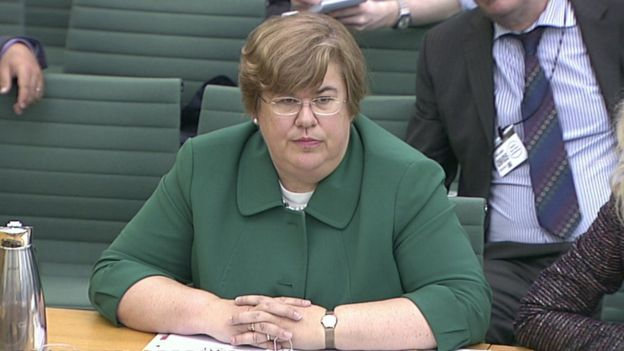MPs have slammed the UK government and its regulators for lacking the “decisiveness and bravery” to defuse the Carillion time bomb and protect the company’s workers, suppliers, investors and customers.
As a client, government accounted for almost half of Carillion’s UK order book, while, as a regulator, it oversaw the whole system of corporate governance that should have spotted glaring problems earlier, said the MPs investigating Carillion’s collapse.

Lesley Titcombe, chief executive of the Pensions Regulator (Parliament TV)
Their final report today puts most blame on Carillion’s former management, but it also finds that the interlocking system of corporate oversight failed to do its job and should be subject to an “ambitious and wide-ranging set of reforms”.
“The mystery is not that [Carillion] collapsed, but that it lasted so long,” said MPs in commentary accompanying the concluding report of the inquiry by the joint Work and Pensions-Business, Energy, and Industrial Strategy (BEIS) committees.
The main regulators involved are the Insolvency Service, the Financial Conduct Authority (FCA), the Financial Reporting Council (FRC) and The Pensions Regulator (TPR).
The MPs said they had “no confidence” in any of these bodies to hold rogue management teams to account.
It said the FRC and TPR were “united in their feebleness and timidity”, and too “passive and reactive” to make effective use of the powers they had.
Any improvement in their performance would depend on a “change of culture and outlook” and, in the TPR’s case, even the replacement of the current leadership.
The FRC was attacked for shutting the stable door only after the horse had bolted. The MPs said it was “content with apportioning blame once disaster has struck” rather than “actively challenging companies and flagging issues of concern to avert avoidable business failures in the first place”.
They accused it of being “timid” in challenging Carillion on its “inadequate and questionable” financial information and “wholly ineffective” in taking its auditors to task.
MPs added that they had “little faith” in the FRC’s ability to complete its investigations in a timely manner. In oral evidence it was pointed out that the council took more than 10 years to report on the collapse of car-maker Rover, and had still not produced its report on PwC’s role in the collapse of British Home Stores two years after the event.
Regarding Carillion’s pensions, the increase in the deficit in the past eight years was about half a billion pounds – the same as the amount as was paid out in dividends, suggesting that the board had been allowed, indirectly, to take money from the company’s workers and give it to the shareholders.
As the MPs put it: “Honouring pension obligations over decades to come was of little interest to a myopic board who thought of little beyond their next market statement.”
Under Section 231 of the 2004 Pensions Act, TPR has the power to intervene and order a company to make increased contributions to its pension pot.
During oral evidence, Lesley Titcombe, the chief executive of TPR (pictured), was accused of failing to make use of these powers even though it had concerns about Carillion’s schemes for many years and Carillion’s pension trustees repeatedly asked it to intervene.
In one heated exchange, Heidi Allen MP said: “You threatened to use [Section 231 powers] in June 2013, July 2013, November 2013, November 2013 again and March 2014, but never actually did. I suppose it is just that wishy-washy area of threatening, threatening, threatening-‘Oh gosh, look. The company has gone belly-up’. When do you use these powers?”
Titcombe replied: “There are some important issues to unpack here. First of all, Section 231 is a difficult power to use. We are seeking some improvements to it, as part of DWP’s work on its White Paper at the moment.”
The report concluded that TPR “clearly failed” in its statutory objectives to reduce the risk of schemes ending up in the Pension Protection Fund and to protect members’ benefits. The regulator only announced an investigation for possible recovery action after the company collapse, when there was next to nothing left to recover.
All the pensioners with schemes in the fund will now receive a reduced level of benefits.
Amid the barrage of criticism, the MPs did have some praise to offer the government.
On 13 January 2018, two days before the company entered liquidation, Philip Green, Carillion’s chairman, approached the government to ask for £160m in financial assistance. The government turned down this “last-minute ransom note”, although it did provide £150m to fund the insolvency and pay Carillion staff who were delivering essential public services.
The report comments: “Philip Green clearly hoped that, faced with the imminent collapse of Carillion, government would conclude it was too big to fail. But the government was correct not to bail out Carillion. Taxpayer money should not be used to prop up companies run by such negligent directors.
“When a company holds 450 contracts with the Government, however, its collapse will inevitably have a significant knock-on effect for the public purse. It is simply not possible to transfer all the risk from the public to the private sector. There is little chance that the £150m of taxpayer money made available to support the insolvency will be fully recovered.”






